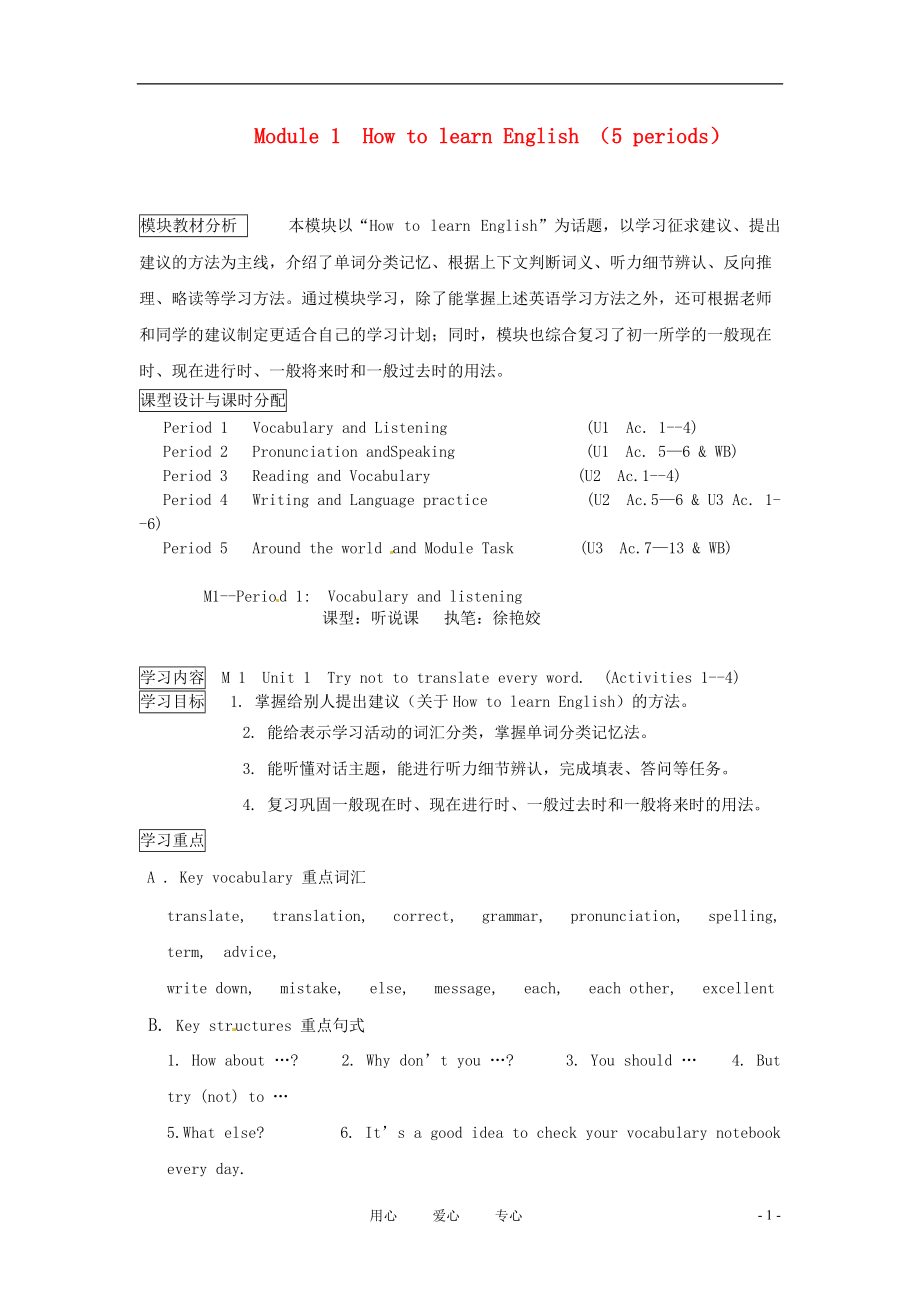《八年級(jí)英語(yǔ)上冊(cè)Module1HowtolearnEnglish學(xué)案外研版》由會(huì)員分享�����,可在線閱讀���,更多相關(guān)《八年級(jí)英語(yǔ)上冊(cè)Module1HowtolearnEnglish學(xué)案外研版(5頁(yè)珍藏版)》請(qǐng)?jiān)谘b配圖網(wǎng)上搜索���。
1、
Module 1 How to learn English (5 periods)
模塊教材分析 本模塊以“How to learn English”為話題���,以學(xué)習(xí)征求建議�、提出建議的方法為主線�����,介紹了單詞分類記憶��、根據(jù)上下文判斷詞義、聽(tīng)力細(xì)節(jié)辨認(rèn)���、反向推理����、略讀等學(xué)習(xí)方法�。通過(guò)模塊學(xué)習(xí),除了能掌握上述英語(yǔ)學(xué)習(xí)方法之外��,還可根據(jù)老師和同學(xué)的建議制定更適合自己的學(xué)習(xí)計(jì)劃���;同時(shí)�����,模塊也綜合復(fù)習(xí)了初一所學(xué)的一般現(xiàn)在時(shí)��、現(xiàn)在進(jìn)行時(shí)����、一般將來(lái)時(shí)和一般過(guò)去時(shí)的用法��。
課型設(shè)計(jì)與課時(shí)分配
Period 1 Vocabulary and Listening
2、 (U1 Ac. 1--4)
Period 2 Pronunciation andSpeaking (U1 Ac. 5—6 & WB)
Period 3 Reading and Vocabulary (U2 Ac.1--4)
Period 4 Writing and Language practice (U2 Ac.5—6 & U3 Ac. 1--6)
Period 5 Around the world and Module Task
3�、 (U3 Ac.7—13 & WB)
M1--Period 1: Vocabulary and listening
課型:聽(tīng)說(shuō)課 執(zhí)筆:徐艷姣
學(xué)習(xí)內(nèi)容 M 1 Unit 1 Try not to translate every word. (Activities 1--4)
學(xué)習(xí)目標(biāo) 1. 掌握給別人提出建議(關(guān)于How to learn English)的方法。
2. 能給表示學(xué)習(xí)活動(dòng)的詞匯分類��,掌握單詞分類記憶法�。
3. 能聽(tīng)懂對(duì)話主題�,能進(jìn)行聽(tīng)力細(xì)節(jié)辨認(rèn),完成填表�、答問(wèn)等任務(wù)。
4. 復(fù)習(xí)鞏固一般現(xiàn)在時(shí)����、現(xiàn)在進(jìn)行時(shí)、一般過(guò)去時(shí)和一般
4�����、將來(lái)時(shí)的用法�。
學(xué)習(xí)重點(diǎn)
A . Key vocabulary 重點(diǎn)詞匯
translate, translation, correct, grammar, pronunciation, spelling, term, advice,
write down, mistake, else, message, each, each other, excellent
B. Key structures 重點(diǎn)句式
1. How about …? 2. Why don’t you …? 3. You should …
5、 4. But try (not) to …
5.What else? 6. It’s a good idea to check your vocabulary notebook every day.
學(xué)習(xí)難點(diǎn) 1. translate, advice, write down, else的用法�����。
2. 提出建議的句式(學(xué)習(xí)重點(diǎn)中B重點(diǎn)句式之1—4)�。
預(yù)習(xí)導(dǎo)航
A). 預(yù)習(xí)P181詞匯表( P2 translate –Orchestra ), 根據(jù)句意和首字母提示完成單詞。
1. I don’t know ho
6、w to learn English, please give me some a___________.
2. If you want to learn English well, try not to t____________ every word.
3. I can’t hear you clearly, please r_________ your words. 4. What e______ can you see?
5. You should check your ___________ (spell) in your homework.
6. My gra
7����、ndfather often reads the n____________ after breakfast.
B). 根據(jù)漢語(yǔ)提示完成下列句子,并預(yù)習(xí)Activity 3 Listen and read, 勾畫(huà)出文中類似的句式和短語(yǔ)��。
1. 你為什么不乘飛機(jī)去北京觀看奧運(yùn)會(huì)呢����?
__________ ___________ you _______ a plane to watch the Beijing Olympics?
= __________ ________ _______ a plane to watch the Beijing Olympics?
2.
8、 你應(yīng)該始終認(rèn)真做作業(yè)�。 You __________ always _________ your homework ____________.
3. 把英語(yǔ)學(xué)好對(duì)我們來(lái)說(shuō)很重要。______ important ______ us ______ _________ English well.
4. 現(xiàn)在是吃晚飯的時(shí)候了����。________ time ______ ________ dinner / _______ dinner.
5. 明天去游泳怎么樣? _________ __________ ___________ swimming tomorrow?
6. 金
9�����、鳳花端起最大的飯碗���,吃完了里面的食物��。
Goldilocks __________ _______ the biggest bowl and finished all the food in it.
7. 我的鋼筆在地上���,幫我撿起來(lái)����。My pen is on the ground, _______me _______ _____ _____.
互動(dòng)研學(xué)
Step I. Warming-up Talk about English learning to lead in. 談?wù)撚⒄Z(yǔ)學(xué)習(xí)
T: English is a widely-used language. But
10���、 what is in English? What are we going to learn (about English)? Do you know? 思考:英語(yǔ)學(xué)習(xí)包括的內(nèi)容有哪些�?
e.g. We’ll learn English letters and words, that is vocabulary “詞匯(表)”
S: ___________________________________________________________________________________
_________________________________
11��、__________________________________________________
Step II. Vocabulary (Activity 1 on P2)
Read the words aloud and try to match them with the headings. (Activity 1 on P2)
Step III. Listening (Activity 2 on P2)
1. Tell the meaning of words in activity 2 and try to give some examples
12����、for each item.
說(shuō)出活動(dòng)2中詞匯的意思�。 (可用英語(yǔ),也可用漢語(yǔ))
2. Then listen and match these words with the conversations. Try to give the reasons.
聽(tīng)對(duì)話�����,連接方框中詞匯和相應(yīng)的對(duì)話�����。 (盡量說(shuō)明理由哦)
Step IV. Listening and reading (Activities 3--4 on P2-3)
A) Teach the sentences structures and phrases. 結(jié)合預(yù)習(xí)導(dǎo)航���,理解重點(diǎn)詞匯和句式�。
13、
1. translate vt. “翻譯” → translation n. “翻譯”
你發(fā)現(xiàn)了什么構(gòu)詞法�?__________________________ 寫(xiě)出你知道的類似構(gòu)詞規(guī)律的詞。
________________________________________________________________________________
2. advice u.n “建議��,忠告���,勸告” → 一條好建議________________
在某方面提供建議________________________
14���、_______________________
3. mistakes c.n. “錯(cuò)誤” → 他很粗心,所以常在作業(yè)中犯錯(cuò)���。
He is ___________, so he often ________ __________in his homework.
4. write down “寫(xiě)下����,記下” → 記下我的電話號(hào)碼����。________ ________ my phone number.
此類動(dòng)詞短語(yǔ)的結(jié)構(gòu)是什么?_________________ 其賓語(yǔ)位置應(yīng)是_____________________.
5. else adj.& adv.
15�����、 “其他” 你知道else 和other的區(qū)別嗎?
________________________________________________________________________________
6. 提出建議的句型 :做某事怎么樣���? 為什么不做某事呢���? 你應(yīng)該做某事。 試著不去做某事���。
①_________________________________ ②______________________________________
③_________________________________ ④ ___________________
16�����、__________________
B) 1. Listen to the conversations between Ms James and her students. 聽(tīng)對(duì)話,了解大意��。
2. Listen again and write notes about learning English. (Activities 4 on P3) 聽(tīng)對(duì)話�,填表格。
C) 1. Listen to the conversation and read it loudly. (Books open) 聽(tīng)對(duì)話并大聲跟讀��。
2. Act out the conversatio
17���、ns in groups. 分組表演對(duì)話����。
拓展提高 A). 選擇填空:
( )1. This is Jim’s Chinese study plan. He ____________ this term.
A. works hard B. worked hard C. is working hard D. is going to work hard
( )2. There are many new words on the blackboard. Please ____________.
A. write down them B. wri
18、te down it C. write them down D. write it down
B). 用括號(hào)內(nèi)所給動(dòng)詞的適當(dāng)形式完成句子:
1. Why don’t you ___________ (come) here earlier? ----OK, I will.
2. He ____________ (put) down the words in his study diary and left the classroom.
3. She did her homework very carefully. She tried ____________________ (not make) mistakes.
課后記 :
- 5 -
用心 愛(ài)心 專心
 八年級(jí)英語(yǔ)上冊(cè)Module1HowtolearnEnglish學(xué)案外研版
八年級(jí)英語(yǔ)上冊(cè)Module1HowtolearnEnglish學(xué)案外研版

